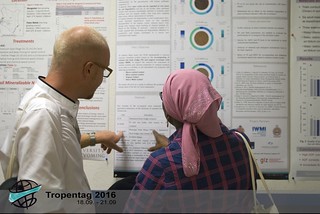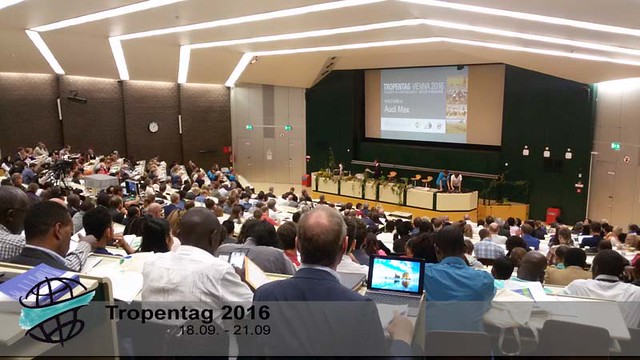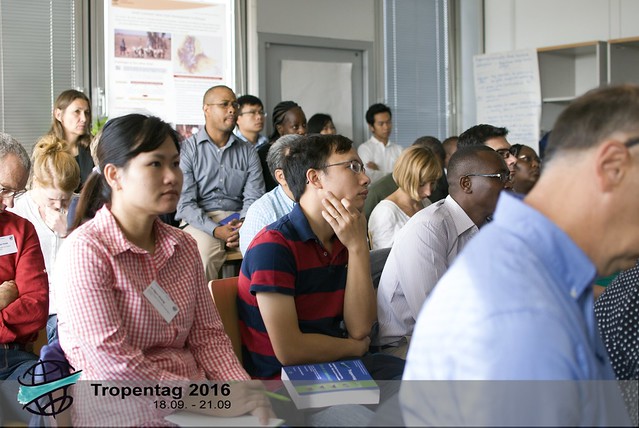Backhaus's blog
Unfamous last words
Fri, 09/23/2016 - 14:00 — BackhausThe last session has ended, posters and flowers have quickly been taken away: Tropentag 2016 is finally over. It’s been three intense days filled with uncountable posters, lively discussions in public and private, fascinating and more or less mass compatible presentations, music, food and lots of coffee. Even dancing!
Many questions have been asked, but some important ones, I must say, have been left unanswered. “What are the next steps to take?” was one of my favourites, asked by Sara Kaweesa, at the end of the closing session, hoping to get a take home message, something to hold on to, so that this conference could actually help to take a step towards a more sustainable and fair world, and not just have been a gathering of many scientific people wanting to talk extensively about their researches and hoping to make a good impression on certain project funding ministries and donors. As Michael Hauser, who by the way together with Ms. Kaweesa has done an impressive job moderating during this conference, has stated, we’ll need to meet again next year, look back at our work and see if we have been true to our many nice, promising words about sustainability, solidarity, food security, fair distribution of resources etc etc.
Toxins in Tropical Food Production
Wed, 09/21/2016 - 16:04 — BackhausDo you know what rice consumption in Nigeria and milk consumption in Kenya have in common? It’s something that both livestock and crop farmers, especially in developing countries, have to deal with: the risk of exposure to mycotoxins in food. One could hear about this topic today, last day of Tropentag 2016, in the fourth oral presentation about food security and nutrition, as well as yesterday in the third poster session about mobile dryland pastoralism. I had the chance to hear both Olusegun O. Atanda’s and Caroline Makau’s research results about such an issue on food safety, which is considered as a specific problem of tropical regions. Exposure to mycotoxins, in fact, should be as low as possible since these are genotoxic and carcinogenic.
In Kenya, aflatoxins (a type of mycotoxin produced by Aspergillus, a species of fungus) pose a safety risk in cow milk. Research revealed that this resulted from poor feed storage and on field infestation during plant growth, which then contaminated animal feeds and finally ended up in the milk. Caroline Makau stated that especially rotten maize cobs used as ingredients in on-farm formulated feeds caused this problem, and that contamination was especially high in peri-urban farms.
Olusegun Atanda’s study is mainly a call for doing more large-scale research and for stressing the need to continually monitor mycotoxin levels in rice. As it seems, this subject is worth being followed in the future.
Today's highlights from maize fertilisers and standard management of monocultures
Tue, 09/20/2016 - 15:37 — BackhausIf yesterday was the day for BIOCHAR, today’s topic of the sessions about soil fertility and nutrient management was MAIZE. From strategies to outbalance nutrient insufficiencies for maize production in Kenya, to fertiliser optimisation under weed competition and the economic analysis of maize production, many aspects have been covered.
Jacobo Arango and Stefan Burkart presented their researches about Brachiaria Humidicola.
Godfrey Nambafu summed up his results about the strategies adopted by African indigenous plants to cope with phosphorus deficient soils.
Personally, I really enjoyed Patrick van Damme’s research results about Sesbania Rostrata, which used to grow on abandoned rice fields and can be cropped and then plowed into the soil in alternation with rice thanks to its beneficial effect through nitrogen fixation.
Later on, I went to the first oral presentation about the same subject and attended Enos Onyuka talking about the organic carbon input into the soil by plant residues of African indigenous plants. He also stressed the potential for increasing the organic carbon availability in AIV by the use of appropriate harvesting techniques.
Challenges to mobile dryland pastoralists
Tue, 09/20/2016 - 14:27 — BackhausIs it the timing? Am I just choosing the unpopular topics? Is the air-conditioning too cold? I think it is. Or is it common that the audiences at poster sessions are usually rather scarce? In occasion of the poster session about Mobile Dryland Pastoralism (2.2, Tuesday 20th, 9:45 am), I found it especially regrettable that not many people attended. So, I decided to highlight some of my favourite topics of today’s poster session 2.2.
Jenny Bischofberger, for example, presented an interesting poster about the integration of stakeholder's knowledge in land-use management in Namibia, based on interviews analyzing their perception about what is most important to save from degradation in the savannah.
I also appreciated Cornelia Heine’s presentation based on a survey about enabling environment and policies related to pastoralism in 26 countries in Asia, Africa, and Latin America, analyzing pastoralist’s livelihoods.
Biochar and Thirsty Goats
Mon, 09/19/2016 - 19:45 — BackhausI don’t know if everyone would agree with me that poster sessions are very entertaining. The first one on Monday about soil fertility and nutrient management (1.2) was actually quite insightful (supposing one has some interest in fertilisers made from waste and fecal sludge or manure from thirsty goats, which sounds meaner than it is – or isn’t it?).
The main topic of this session was biochar: Just put biochar on maize and see what happens. Irrigate your crop with wastewater or add biochar and, again, see what happens. Filter your wastewater with biochar, put the biochar on your crop and, oh yes, see what happens.

These research topics were indeed highly interesting, and I would invite you to go see the posters yourself and get your own impression. You will also find more information about conservation agriculture practices in Kenya and how to grow Cassava in the D.R. Congo.
By the way, there will be another poster session about this subject tomorrow morning, and the oral presentations at 11:30 am. It’s certainly worth a look!
Festive opening session at the Audimax
Mon, 09/19/2016 - 16:08 — BackhausToday at 12:30 pm the Tropentag 2016 has been officially opened in the Audimax by Bernhard Freyer, director of the Division of Organic Farming at BOKU University. Let's recall together, in order of appearance of the speechmakers, what has been said.

Joseph Glössl, Vice Chancellor for Research, welcomed the keynote speakers and introduced BOKU University emphasizing the role of its Centre for Development Research.
Robert Zeiner, head of Programmes and Projects International (ADA), appealed to all countries and stakeholders to act, and in general to support fair and sustainable production and resource management as well as to strengthen vulnerable groups. He stressed the importance of sustainable land use and local land management in assuring food security and avoiding resource related conflicts. Also, he underlined that equal access for smallholder farms is necessary.
Gerardo Patacconi, Officer-in-Charge at BOKU, then stressed the importance of sustainability and fairness in development work which could only be achieved by working together.
"Are you lecturing them?" - Self-critical reflexion on 5 year CGIAR experiment about livestock value chains
Mon, 09/19/2016 - 14:02 — BackhausIt’s nine o’clock on the first day of the Tropentag 2016, the room quickly filled up with people eager to hear what’s new about the sustainable integration of livestock smallholders in value chains through multi-stakeholder platforms. Following the motto „More meat, milk and fish for and by the poor “, during this interactive workshop CGIAR presented the results of their five-year research in developing countries, encouraging to ask critical and challenging questions in order to improve their model.

Background of the experiment is the increasing demand of livestock in developing countries, where smallholders currently provide about 70% of livestock produce. While the production of livestock thus offers great business opportunities, smallholders are often not part of this transition. CGIAR, in this “very expensive experiment”, tried to develop models, strategies and technologies to empower smallholders and women, ensure food security and improve health and environmental issues, amongst others.
New arrivals - expectations of a student reporter at Tropentag 2016
Sun, 09/18/2016 - 09:42 — BackhausWhat to expect from the Tropentag 2016 in Vienna?
As a student reporter and student of horticultural sciences I am eager to immerse myself into the universe of this conference, listening, asking, observing and of course, reporting - critically, curiously and controversal.
Join the discussion!
Click here to visit the Tropentag website





